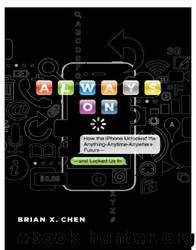Always On by Brian Chen

Author:Brian Chen [Chen, Brian]
Language: eng
Format: epub
Publisher: Da Capo Press
Published: 2011-05-18T07:00:00+00:00
Research on media multitasking is still at an early stage, but one study is already challenging the notion that human brains are not meant to multitask. A University of Utah study published in 2010 suggests that some human beings are excellent multitaskers, whom the study labeled “supertaskers.”15 Researchers Jason Watson and David Strayer put two hundred college undergrads through a driving simulator, in which they were required to “drive” behind a virtual car and brake whenever its brake lights shone while at the same time performing various tasks such as memorizing and recalling items in the correct order and solving math problems.
Watson and Strayer analyzed the students based on their speed and accuracy in completing the tasks, and the researchers discovered that a small minority—just 2.5 percent (three men and two women) of the subjects—showed absolutely no performance decrements when performing single tasks versus dual tasks. Rather, these few individuals excelled at multitasking. Additionally, contrasting with the results of Stanford’s study, the supertaskers were better at task switching and performing individual tasks than the rest of the group.
The rest of the group, however, did show overall degraded performance when handling dual tasks compared to a single task, suggesting that the vast majority of people may indeed be slower when processing multiple activities. But the discovery of supertaskers argues against the popular theory that the human brain is not meant to multitask, Watson and Strayer say. “Our results suggest that there are supertaskers in our midst—rare but intriguing individuals with extraordinary multitasking ability,” Watson and Strayer wrote. “These individual differences are important because they challenge current theory that postulates immutable bottlenecks in dual-task performance.”
Keeping in mind that the 24/7 multitasking lifestyle isn’t new at all is worthwhile. Even though most of us probably aren’t “supertaskers,” we’ve been multitasking our entire lives in the everyday world. We can dribble a basketball while running, jot down notes while listening to a lecture, and jog through the park while listening to music. In fact, Vaughan Bell, a clinical and neuropsychologist at the Universidad de Antioquia, Colombia, argued that the most common, information-dense, and attention-demanding task is caring for children. “If you think Twitter is an attention magnet, try living with an infant,” Bell said. “Kids are the most distracting thing there is, and when you have three or even four in the house it is both impossible to focus on one thing, and stressful, because the consequences of not keeping an eye on your kids can be frightening even to think about.”16 Kids are indeed distracting: a British study found that for drivers, the distraction of squabbling kids can slow down brake reaction times by 13 percent—as much as alcohol.17
Bell added that people in poorer neighborhoods that use very little technology (like Medellín, Colombia, where he resides) hardly live distraction-free lives. They have to watch their food because there is no timer; washing clothes has to be done by hand while keeping an eye on everything else; and when a street vendor passes by
Download
This site does not store any files on its server. We only index and link to content provided by other sites. Please contact the content providers to delete copyright contents if any and email us, we'll remove relevant links or contents immediately.
Learning SQL by Alan Beaulieu(6291)
Weapons of Math Destruction by Cathy O'Neil(6280)
Digital Minimalism by Cal Newport;(5765)
iGen by Jean M. Twenge(5416)
Sapiens by Yuval Noah Harari(5371)
The Age of Surveillance Capitalism by Shoshana Zuboff(4293)
Elon Musk by Ashlee Vance(4127)
Thing Explainer by Randall Munroe(3940)
Apollo 8 by Jeffrey Kluger(3709)
Future Crimes by Marc Goodman(3600)
The Science Book (Big Ideas Simply Explained) by DK(3287)
The Innovators: How a Group of Hackers, Geniuses, and Geeks Created the Digital Revolution by Walter Isaacson(3210)
Who Can You Trust? by Rachel Botsman(3133)
I Live in the Future & Here's How It Works by Nick Bilton(2997)
Infinite Energy Technologies by Finley Eversole(2985)
Steve Jobs by Walter Isaacson(2899)
Dawn of the New Everything by Jaron Lanier(2772)
Chernobyl by Serhii Plokhy(2538)
Ben Franklin's Almanac by Candace Fleming(2531)
